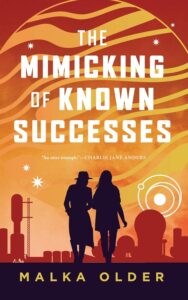In 1926, John Watson, friend and confidant of Sherlock Holmes, was shot by “Killer” Evans in the the story the Three Garridebs. What Holmes says in the moment is, “You’re not hurt, Watson? For God’s sake, say that you are not hurt!” In subsequent media presentations, this has been portrayed as Holmes using Watson’s given name in a moment of emotional weakness. But surely, long before that, the women who read the adventures of this consulting detective and his bosom friend had done what fandom continues to do….queer the heck out of Holmes and Watson. Stephen Moffat’s series Sherlock rested heavily on that understood relationship, with an ongoing joke that Watson is constantly assumed to be Holmes’ partner. I imagine that a great deal of research has been written about the way Moffat gave himself credit for a progressive relationship that he did not actually portray. Certainly, many fans of the series did.
But, for many diverse reasons I have found myself reading several books recently that are queer re-thinking of Holmes and Watson and since they are all relevant to our interests in one way or another, I thought I’d gather them up in one overview for your entertainment. As always, links here are to Amazon, but in most cases, give your local library a shot first. They’ll have them.
 To begin with, I’ll look a few years back to Claire O’Dell’s Sara Holmes series. The first book, A Study in Honor, traces the adventure of Janet Watson, newly return from war with faulty cyborg prosthesis, and Sara Holmes. In this series, Holmes and Watson are two queer black women who find themselves on the wrong side of a government conspiracy and corrupt medical practices.
To begin with, I’ll look a few years back to Claire O’Dell’s Sara Holmes series. The first book, A Study in Honor, traces the adventure of Janet Watson, newly return from war with faulty cyborg prosthesis, and Sara Holmes. In this series, Holmes and Watson are two queer black women who find themselves on the wrong side of a government conspiracy and corrupt medical practices.
It’s been a while since I read this one, but the tension between Holmes and Watson is not treated as a joke, nor a handwave, nor is it likely to be resolved. Watson’s wounds from the war go deep. Their blackness and how they are treated by the people who require them to work for them is more relevant than their queerness, but both are relevant. The giant conspiracy is a bit unconvincing, but who cares, really? It’s a scifi/fantasy. Handwave the plot and pay attention to the characters.
If you like your Holmes and Watson a little on the dark side, I’d recommend this book and the sequel,
 Next up is a story that takes the idea of Holmes and Watson and uses them as metaphor. In A Case of Madness:(or The Curious Appearance of Holmes in the Nighttime) by Yvette Knopp, Holmes scholar Andrew Thomas has lost literally everything he thought he was and what is left is not making him at all happy.
Next up is a story that takes the idea of Holmes and Watson and uses them as metaphor. In A Case of Madness:(or The Curious Appearance of Holmes in the Nighttime) by Yvette Knopp, Holmes scholar Andrew Thomas has lost literally everything he thought he was and what is left is not making him at all happy.
A lifetime of pretending he is not gay has failed to prove successful and, after a long horrible night in which he saves someone’s life, but is gay-bashed for his efforts, he begins to hallucinate Sherlock Holmes. As his life burns down around him, what is growing from the ashes is a “him” he’s spent his whole life avoiding.
This sounds dire, but it’s actually more “gonzo fever-dream” than dire. Andrew’s pretty unlikeable, but that’s mostly because he does not like himself. There’s a lot of running around London at night and a ridiculously cheerful ending as Andrew finally sheds his old self.
Holmes (and, to a lesser extent, Watson) are symbolic here, rather than literal, they indicate the level of self-delusion that Andrew is dealing with. They don’t interact with each other at all, which maybe was a wasted opportunity, but as they are not really characters in the story, but just characters in Andrew’s mind, it’s not that relevant.
 Which brings me to Nakanomori Kouko Bungeibu no Holmes & Watson (中野森高校文芸部のホームズ&ワトソン). While in Japan last year, this was one of the books I picked up randomly. It was in a Yuri section and had a Holmes & Watson tie-in and, well, you got me there. Was it Yuri, really? Nah, and the ending was the one thing I hoped it would not do, but it wasn’t a terrible read.
Which brings me to Nakanomori Kouko Bungeibu no Holmes & Watson (中野森高校文芸部のホームズ&ワトソン). While in Japan last year, this was one of the books I picked up randomly. It was in a Yuri section and had a Holmes & Watson tie-in and, well, you got me there. Was it Yuri, really? Nah, and the ending was the one thing I hoped it would not do, but it wasn’t a terrible read.
Manase Akira’s desire is to be a great detective. She comes to their high school’s literature club room to ask Todo Motoko – whose detective novel is the only one Akira has ever read – to be her assistant. This dumps them into a number of mysteries, from the mysterious extra piece of cake in a cake shop, to the disturbing reason the entire third-year class’s grades have been altered. Motoko comments off-handedly that Akira is very attractive – something not really expressed by the art in this light novel – and one of the lit club’s sempai shows a slightly more intimate relationship with Motoko than the other members. If there is a Yuri relationship, I’d say Hitomi-sempai “like” likes Motoko, but isn’t going there.
What we do get is a decent enough Holmes and Watson dynamic from Akira and Motoko. Akira already knows whodunnit, when she asks Motoko for her theories, but likes to have the other girl bounce theories off her to help her think. Unlike Holmes, Akira appreciates Motoko’s writing and when, because of one of the mysteries, Motoko and Akira stop speaking, it’s a major turning point for their relationship. Of all these stories, it’s probably the least queer, but a solid rep for Holmes and Watson.
 And last, the incredible The Mimicking of Known Successes by Malka Older. Once again, we meet two women, Mossa and Pleiti, drawn together by a series of inexplicable happenings along the railroad that connects human habitations in the rings of Jupiter. A man steps off the platform and disappears – was it suicide or something else? This story drags our queered Holmes and Watson into a massive and improbable conspiracy – as all conspiracies usually are.
And last, the incredible The Mimicking of Known Successes by Malka Older. Once again, we meet two women, Mossa and Pleiti, drawn together by a series of inexplicable happenings along the railroad that connects human habitations in the rings of Jupiter. A man steps off the platform and disappears – was it suicide or something else? This story drags our queered Holmes and Watson into a massive and improbable conspiracy – as all conspiracies usually are.
This one takes law-woman Mossa to a frontier town, and back to the comfortable, oddly Victorian rooms at college, where she once again meets her old college roommate and former lover, researcher Pleiti. The Imposition of Unnecessary Obstacles continues their story as multiple students and teachers have gone missing from the university….but no one seems to have noticed.
Of the many Holmes and Watsons in this list, these last two are the least traumatized, most comfortably queer and, in many ways, the best of the Holmes and Watsons. Mossa’s quirks are not pathologized, or dismissed – they are treated as a fact of her existence. Pleiti’s work as a researcher is considered to be an important part of her life, as being a doctor is in Watson’s. In the first book, they address the history between them – in a way that acknowledges that we change as people. I found this to be the most mature relationship on this list. Highly recommended for anyone looking for a queered Holmes and Watson. ^_^
These are hardly the only queered versions of Holmes and Watson to be found, but I hope you’ll give a few of these a chance and let me know about any good iterations you’ve encountered. ^_^
![]()
![]()
![]()
![]()
![]()
![]()
![]()
![]()
![]()
![]()
![]()
![]()
![]()
![]()
![]()
![]()
![]()
![]()
![]()
![]()
![]()


